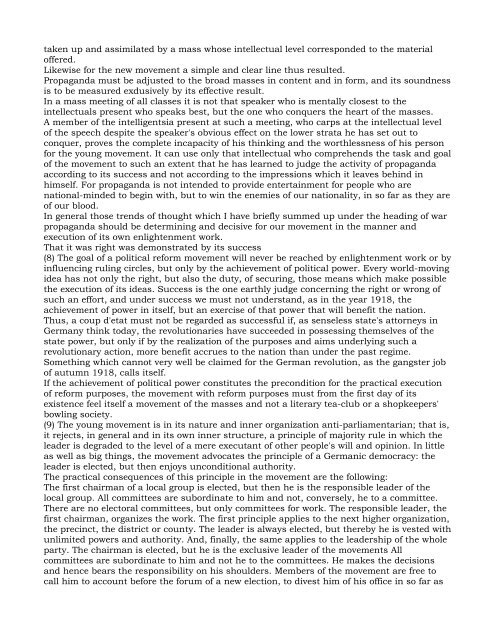Mein Kampf by Adolf Hitler
Mein Kampf by Adolf Hitler
Mein Kampf by Adolf Hitler
- TAGS
- kampf
- adolf
- hitler
- stuff2share.com
Create successful ePaper yourself
Turn your PDF publications into a flip-book with our unique Google optimized e-Paper software.
taken up and assimilated <strong>by</strong> a mass whose intellectual level corresponded to the material<br />
offered.<br />
Likewise for the new movement a simple and clear line thus resulted.<br />
Propaganda must be adjusted to the broad masses in content and in form, and its soundness<br />
is to be measured exdusively <strong>by</strong> its effective result.<br />
In a mass meeting of all classes it is not that speaker who is mentally closest to the<br />
intellectuals present who speaks best, but the one who conquers the heart of the masses.<br />
A member of the intelligentsia present at such a meeting, who carps at the intellectual level<br />
of the speech despite the speaker's obvious effect on the lower strata he has set out to<br />
conquer, proves the complete incapacity of his thinking and the worthlessness of his person<br />
for the young movement. It can use only that intellectual who comprehends the task and goal<br />
of the movement to such an extent that he has learned to judge the activity of propaganda<br />
according to its success and not according to the impressions which it leaves behind in<br />
himself. For propaganda is not intended to provide entertainment for people who are<br />
national-minded to begin with, but to win the enemies of our nationality, in so far as they are<br />
of our blood.<br />
In general those trends of thought which I have briefly summed up under the heading of war<br />
propaganda should be determining and decisive for our movement in the manner and<br />
execution of its own enlightenment work.<br />
That it was right was demonstrated <strong>by</strong> its success<br />
(8) The goal of a political reform movement will never be reached <strong>by</strong> enlightenment work or <strong>by</strong><br />
influencing ruling circles, but only <strong>by</strong> the achievement of political power. Every world-moving<br />
idea has not only the right, but also the duty, of securing, those means which make possible<br />
the execution of its ideas. Success is the one earthly judge concerning the right or wrong of<br />
such an effort, and under success we must not understand, as in the year 1918, the<br />
achievement of power in itself, but an exercise of that power that will benefit the nation.<br />
Thus, a coup d'etat must not be regarded as successful if, as senseless state's attorneys in<br />
Germany think today, the revolutionaries have succeeded in possessing themselves of the<br />
state power, but only if <strong>by</strong> the realization of the purposes and aims underlying such a<br />
revolutionary action, more benefit accrues to the nation than under the past regime.<br />
Something which cannot very well be claimed for the German revolution, as the gangster job<br />
of autumn 1918, calls itself.<br />
If the achievement of political power constitutes the precondition for the practical execution<br />
of reform purposes, the movement with reform purposes must from the first day of its<br />
existence feel itself a movement of the masses and not a literary tea-club or a shopkeepers'<br />
bowling society.<br />
(9) The young movement is in its nature and inner organization anti-parliamentarian; that is,<br />
it rejects, in general and in its own inner structure, a principle of majority rule in which the<br />
leader is degraded to the level of a mere executant of other people's will and opinion. In little<br />
as well as big things, the movement advocates the principle of a Germanic democracy: the<br />
leader is elected, but then enjoys unconditional authority.<br />
The practical consequences of this principle in the movement are the following:<br />
The first chairman of a local group is elected, but then he is the responsible leader of the<br />
local group. All committees are subordinate to him and not, conversely, he to a committee.<br />
There are no electoral committees, but only committees for work. The responsible leader, the<br />
first chairman, organizes the work. The first principle applies to the next higher organization,<br />
the precinct, the district or county. The leader is always elected, but there<strong>by</strong> he is vested with<br />
unlimited powers and authority. And, finally, the same applies to the leadership of the whole<br />
party. The chairman is elected, but he is the exclusive leader of the movements All<br />
committees are subordinate to him and not he to the committees. He makes the decisions<br />
and hence bears the responsibility on his shoulders. Members of the movement are free to<br />
call him to account before the forum of a new election, to divest him of his office in so far as


